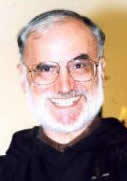There is something
moving about today’s Gospel. Matthew isn’t telling
us what Jesus said or did someday for some person,
but what Jesus said and did for him personally.
It is an autobiographical passage, the story of the
meeting with Christ that changed his life. “As Jesus
passed on from there, he saw a man named Matthew
sitting at the customs post. He said to him, ‘Follow
me.’ And he got up and followed him” (Matthew 9:9).
But this episode is not reported in the other
Gospels because of its personal importance for
Matthew. The interest in this passage has to do with
what happens after the moment of the call. Matthew
wants to offer “a banquet at his house” to bid
farewell to his coworkers, “publicans and sinners.”
The Pharisees’ negative reaction was to be expected.
Jesus answers them: “Those who are well do not need
a physician, but the sick do. Go and learn the
meaning of the words, ‘I desire mercy, not
sacrifice’” (Matthew 9:12-13).
What does this line that Christ takes up from the
prophet Hosea mean? Does it mean that all sacrifice
and mortification are useless and that we only need
to love to set everything right? From this passage
some might conclude that we should reject the whole
ascetic attitude of Christianity as a residue of a
rigorist or Manichean mentality that today we have
left behind.
First of all it is important to note the profound
change in perspective in the passage from Hosea to
Christ. In Hosea, the words refer to man, to what
God wants from man. God wants love and awareness
from man, not external sacrifices and animal
holocausts.
As spoken by Jesus, these words refer instead to
God. The love that is spoken of is not that which
God expects from man, but the love God has for man.
“I desire mercy, not sacrifice” means: I want to be
merciful, not to condemn. Its biblical equivalent is
found in Ezekiel: “I do not want the death of the
sinner, but that he convert and live.” God does not
want to “sacrifice” his creature but to save him.
With this qualification, we better understand the
passage in Hosea better too. God does not want
sacrifice “at all costs,” as if he took pleasure in
seeing us suffer; nor does he want sacrifices that
are aimed at placing our rights and merits before
him, or that result from a misunderstanding of duty.
He wants rather the sacrifice that is required by
his love and by the observance of the commandments.
In the “Imitation of Christ” it says “one does not
live in love without suffering,” and this is
confirmed by daily experience. There is no love
without sacrifice. In this sense, Paul invites us to
make our whole life “a living sacrifice, holy and
pleasing to God” (Romans 12:1).
Sacrifice and mercy are both good things but they
can become bad if misapplied. They are good things
if -- as Christ did -- we choose sacrifice for
ourselves and mercy for others; they can become bad
things if on the contrary we choose mercy for
ourselves and sacrifice for others, that is, if we
are indulgent with ourselves and rigorous with
others, ready to excuse ourselves and quick to judge
others. Do we really have nothing to think about, in
this regard, in our conduct?
We cannot conclude this comment on the call of
Matthew without an affectionate and grateful thought
about this evangelist who will accompany us during
this liturgical year. Thank you, Matthew also called
Levi. How much poorer our knowledge of Christ would
be without you!

